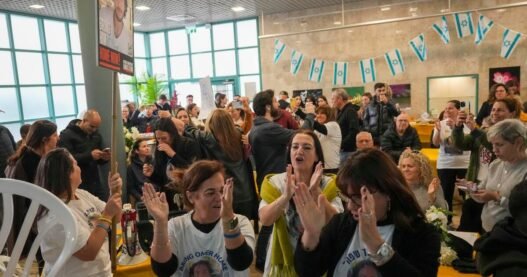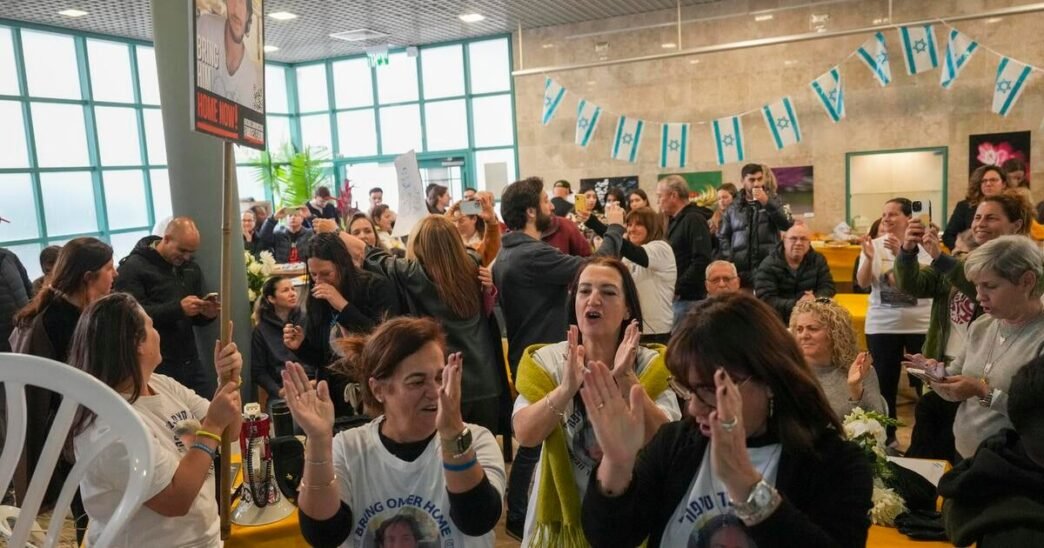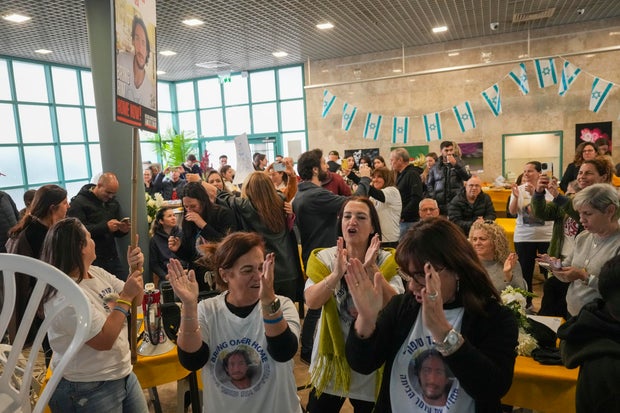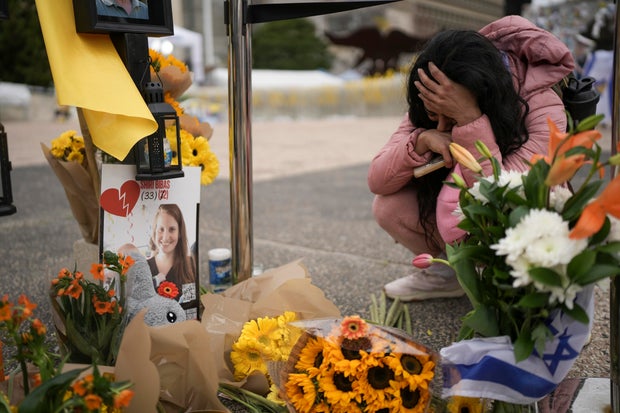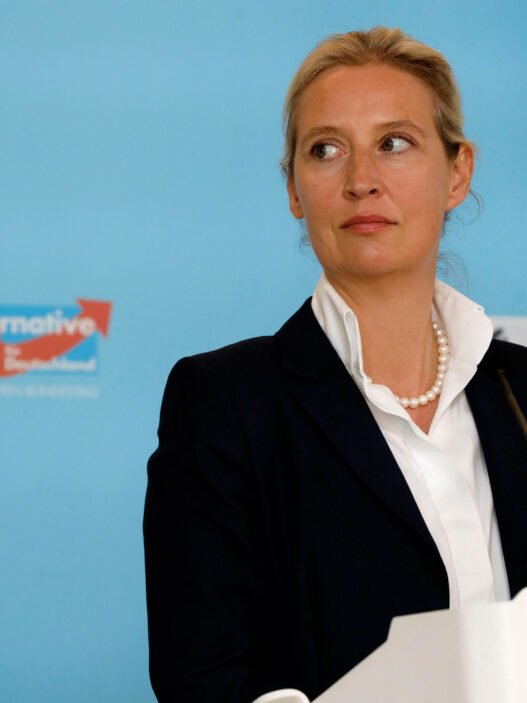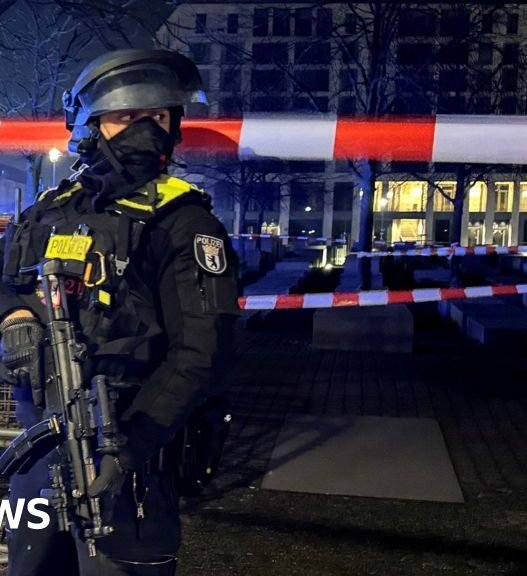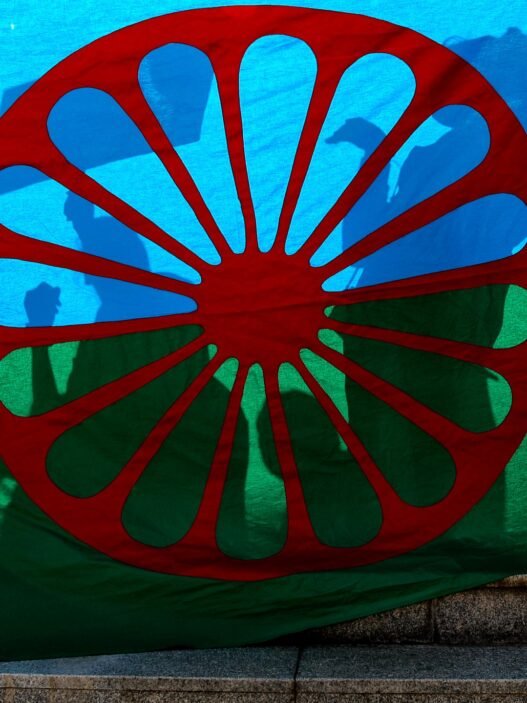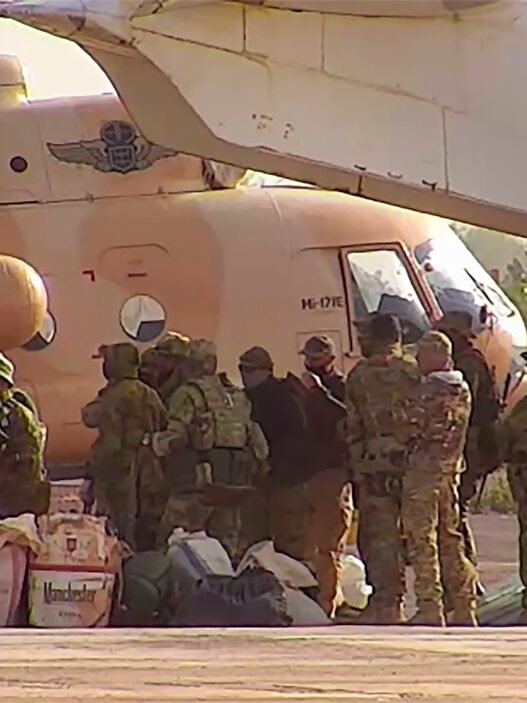Hamas freed the first five of six Israeli hostages due to be released Saturday even as heightened tension between the adversaries clouded the future of the fragile ceasefire deal.
The five included three Israeli men seized while attending the Nova music festival and another abducted while visiting his family in southern Israel when militants stormed across the border in the Oct. 7, 2023 attacks that triggered Israel’s nearly 16-month campaign in Gaza.
The fifth man released and the sixth due to be freed later Saturday have been held by Hamas for around a decade since they each entered Gaza on their own.
They were handed over to the Red Cross in two separate ceremonies in Gaza, brought out on stages by masked, armed Hamas fighters in front of hundreds of Palestinians. In the central town of Nuseirat, Omer Wenkert, Omer Shem Tov and Eliya Cohen were posed alongside fighters – and a beaming Shem Tov even kissed the militant next to him on the head and blew kisses to the crowd. They were then put in Red Cross vehicles and taken to Israeli troops.
Watching the release, Cohen’s family and friends in Israel chanted “Eliya! Eliya! Eliya!” and cheered when they saw him for the first time. Shem Tov’s grandmother ululated in joy, shrieking, “Omer, my joy! My life!” as she saw him. The three were put in Red Cross vehicles that then headed for Israel. The Israeli military said the three were in their custody, and wound undergo an initial medical assessment.
Ohad Zwigenberg / AP
Earlier in the day, two other hostages — identified as Avara Mengistu, 38, who entered Gaza in 2014 and has been held there ever since, and Tal Shoham, 40, who was taken hostage on Oct. 7 — were put into Red Cross vehicles after being brought out onto a stage by masked and armed Hamas fighters in front of a crowd in the southern Gaza city of Rafah. Soon after, the Israeli military confirmed that the two had been brought into Israel.
“This is an unforgettable moment, where all emotions are rapidly mixing together. Our Tal is with us,” Shoham’s family said in a statement, calling for a deal the be reached for the release of all those still captive. Shoham’s wife, two young children, and three other relatives who were abducted with him were freed in a November 2023 exchange. “There is a window of opportunity; we must not miss it.”
Mengistu, an Ethiopian-Israeli, had been held in Gaza since entering on his own in 2014. Watching the handover on Israeli media, Mengistu’s family broke out into a Hebrew song, “Here is the Light,” as they saw him for the first time in more than a decade.
A sixth man is also expected to be released Saturday. Hisham Al-Sayed, 36, entered Gaza in 2015 and has been held ever since.
More than 600 Palestinians jailed in Israel will be freed in exchange, the Palestinian prisoners media office said Friday. The prisoners set for release include 50 serving life sentences, 60 with long sentences, 47 who were released under a previous hostage-for-prisoner exchange and 445 Palestinians who were seized by Israeli troops in Gaza since the war began.
Ariel Schalit / AP
Remains of Shiri Bibas returned, family says
The latest hostage exchange is going ahead after tensions mounted over a grisly and heart-wrenching dispute triggered this week when Hamas initially handed over the wrong body for Shiri Bibas, an Israeli mother of two young boys abducted by militants.
The remains that Hamas transferred with her sons’ bodies on Thursday were later determined to be those of an unidentified Palestinian woman. In response, Israeli Prime Minister Benjamin Netanyahu vowed revenge for “a cruel and malicious violation,” while Hamas suggested it had been a mistake.
On Friday night, the small militant group believed to have been holding Bibas and her sons — the Palestinian Mujahedeen Brigades — said it handed over a second body. On Saturday morning, Bibas’ family said Israeli forensic authorities had confirmed the remains were hers.
Oded Balilty / AP
“For 16 months we sought certainty, and now that it’s here, it brings no comfort, though we hope it marks the beginning of closure,” the family said.
The dispute over the body’s identity raised new doubt about the ceasefire deal, which has paused over 15 months of war but is nearing the end of its first phase. Negotiations over a second phase, in which Hamas would release dozens more hostages in exchange for a lasting ceasefire and an Israeli withdrawal, are likely to be even more difficult.
First phase of ceasefire set to end next week
Hamas has said it will also release four more bodies next week, completing the first phase of the ceasefire. If that plan is carried out, Hamas would retain about 60 hostages, about half of whom are believed to be alive.
Yael Alexander, whose son Edan is thought to be the last living American hostage, said the situation is a “nightmare.”
“If suddenly they decided ‘OK, it’s not working, let’s stop and that’s it, no releases of hostages, this will be a disaster for us the families,” Alexander said.
The statement from the Bibas family said “there is no more important goal” than the release of the remaining hostages.
Hamas has said it won’t release the remaining captives without a lasting ceasefire and a full Israeli withdrawal. Netanyahu, with the full backing of the Trump administration, says he’s committed to destroying Hamas’ military and governing capacities and returning all the hostages, goals widely seen as mutually exclusive.
Trump’s proposal to remove about 2 million Palestinians from Gaza so the U.S. can own and rebuild it has thrown the ceasefire into further doubt. His idea has been welcomed by Netanyahu but universally rejected by Palestinians and Arab countries.
Trump said Friday that he was “a little surprised” by rejections of the proposal by Egypt and Jordan and that he would not impose it.
“I’ll tell you, the way to do it is my plan. I think that’s the plan that really works. But I’m not forcing it. I’m just going to sit back and recommend it,” Trump said in a Fox News interview.
Israel’s military offensive killed more than 48,000 Palestinians, mostly women and children, according to Gaza’s Health Ministry, which doesn’t distinguish between civilians and combatants. Israel says it has killed more than 17,000 fighters, without providing evidence.
The offensive destroyed vast areas of Gaza, reducing entire neighborhoods to rubble. At its height, the war displaced 90% of Gaza’s population. Many have returned to their homes to find nothing left and no way of rebuilding.
“We’ve had enough of war,” Wahiba Muheisen, who lost her husband and three sons and now lives in a tent beside her ruined home, told CBS News. “I’ve lost so much.”
